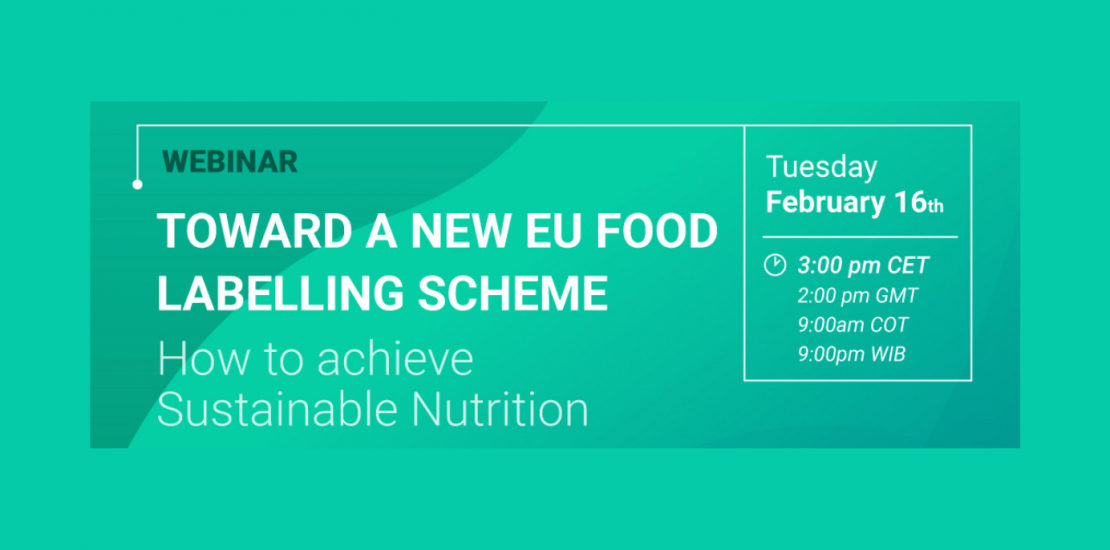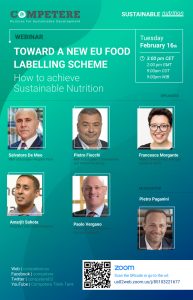Toward a new EU food labelling scheme. How to achieve Sustainable Nutrition? – LIVE TALKSustainable Nutrition Watch
- 9 February 2021
- Posted by: Competere
- Categories: Empowering Consumers, events, highlights, News, Sustainable Nutrition

Toward a new EU food labelling scheme. How to achieve Sustainable Nutrition? – LIVE TALK
TUESDAY 16th FEBRUARY – h. 3PM CET / 2PM GMT / 9 AM COT / 9PM WIB
WATCH THE LIVE TALK HERE
Clear food labelling is an integral part of the transition to sustainable food systems, empowering consumers to make more sustainable food choices. In particular, the goal of the European Commission is to build on the EU Green Deal and the F2F strategy to generate a labelling scheme that promotes sustainable eating. But how can it be? How can we define “sustainability” related to food production and spreading? Creating an EU-wide labelling scheme for sustainable food entails a worldwide assessment of the supply chain. What should be the role of partner and producing countries in this? With its Sustainable Nutrition Watch Competere aims at defining new innovative policy guidelines to reach efficient food sustainability strategies.
SPEAKERS
MEP Salvatore De Meo, Member of the European Parliament, Group of the European People’s Party.
MEP Pietro Fiocchi, Member of the European Parliament, Group of European Conservatives and Reformists.
Francesca Morgante, Market Development Manager Europe at the Roundtable on Sustainable Palm Oil.
Amarjit Sahota, President of Ecovia Intelligence.
Paolo Vergano, Partner at Fratini Vergano, International Trade Law and Food Law.
MODERATING THE DEBATE
Pietro Paganini, Competere.eu
SYNTHESIS:
SALVATORE DE MEO: “The current labelling system is complex and often not a very transparent tool for both consumers and producers. There are two main labelling scheme we are considering today: NutriScore and NutriInforme. The first one is not based on a scientific principle but on algorithms and, thus, risk to discriminate specific foods. The most widespread and consolidated scientific literature underlines there are not good foods or bad foods but only balanced or unbalanced diets. NutrInforme is based exactly on this assumption”.
AMARJIT SAHOTA: “Most of the eco-label production has started in the last 15 years. We now have over 2000 labels representing some ethical or sustainability related standard. We have more and more labels for one single ingredient, and multiple labels for one product. As the British author Philip Pullman underlined ‘People are too complicated to have single labels‘. As our lives become more complicated we want to see more labels representing different attributes”.
FRANCESCA MORGANTE: “RSPO has set up 2 certification systems to ensure that palm oil is produced sustainably and the integrity of trade in sustainable palm production. In 2011, RSPO launched RSPO Trademark aimed at bridging the gap between the upstream and downstream palm oil production and distribution system. So far, Trademark use has grown from 12 to 67 countries.
PAOLO VERGANO: “We know that a labelling scheme to certify what is sustainable and what is not will be mandatory, and it will need to be turned into law by governments. The scheme the EU will adopt needs to be based on science and transparency, and it will need to be the less trade distorting as possible.
PIETRO FIOCCHI: “The starting point is to educate consumers: it’s controversial but it’s important to have a general scheme for consumers to know what it’s good and what is not. There are a lot of commercial and national interest involved in this effort: to try to find a unique labelling scheme for the whole European continent will be difficult because in Europe we have cultural, social, territorial differences and different diets”.
WATCH AGAIN THE DEBATE:

SPEAKER’S BIO
MEP Salvatore De Meo
He is a full member of the Committee on Agriculture and Rural Development, a substitute member of the Committee on the Internal Market and Consumer Protection and the Committee on Industry, Research and Energy. He is also a full member of the Delegation to the EU-Serbia Stabilisation and Association Parliamentary Committee, a full member of the Delegation for relations with India and a substitute member of the Delegation to the EU-Russia Parliamentary Cooperation Committee.
MEP Pietro Fiocchi
He is a full member of the Committee on Environment, Public Health and Food Safety, a substitute of the Committee on Industry, Research and Energy. He is also a full member of the European Parliament’s Delegation for relations with the United States of America (D-US) and full member of the Special Committee on Beating Cancer.
Francesca Morgante
Francesca Morgante joined RSPO in October 2018. She has been appointed as Market Development Manager for Europe. Her role consists of engaging with stakeholders to help increase the uptake of certified sustainable palm oil in the European market. Before joining RSPO she was responsible for the development of a quality seal for natural and organic cosmetics, where she gained sound knowledge on how to strategically position private standards in different markets. Francesca holds a degree in Development and International Cooperation from the Bologna University and has a working experience of over 10 years within the non-profit sector at international level.
Amarjit Sahota
Mr. Sahota is the founder and president of Ecovia Intelligence (formerly Organic Monitor), a London-based specialist research, consulting & training firm that specialises on global sustainable product industries. Mr. Sahota has been involved in the health, wellness and sustainable industries for over 20 years. He has assisted a wide range of clients in realising their business potential in these industries. His clients range from multinationals, government organizations, to dedicated sustainable product companies.
Research and analysis of Mr. Sahota has been quoted extensively in the media, including The Financial Times, The Independent, Forbes, Fortune, BBC World Service, The Economist, Food Chemical News, The Straits Times, South China Morning Post, CNBC News, Nordic Business Report and Asian Business.
Paolo Vergano
Paolo graduated at the School of Law of the University of Torino, Italy (1995) and holds a Master’s degree in International Business and Trade Law from the University of Fordham’s School of Law in New York, USA (1997). Prior to that, he obtained an Erasmus Diploma at the University of Limburg in Maastricht, the Netherlands (1994) and a Diplôme Supérieur de Droit Comparé at the Faculté Internationale de Droit Comparé in Strasbourg, France (1996). He is admitted in Belgium and is a member of the Brussels Bar (“A” list).
Paolo is a regular speaker at conferences around the world on international trade issues and has authored or co-authored a number of articles and legal essays. He has been the 2014-2016 Chair of the International Trade Committee of the Inter-Pacific Bar Association (IPBA). Paolo is a frequent lecturer in a number of Universities on issues of WTO law and dispute settlement. Since 2002, he is part of the faculty at the World Trade Institute in Berne, Switzerland where he teaches a course on “Tariffs, Quantitative Restrictions and Voluntary Export Restraints”. Since 2014, he teaches courses on “Trade Advocacy and Litigation Strategies” and “Non-Tariff Measures” at Universitas Pelita Harapan in Jakarta, Indonesia.

